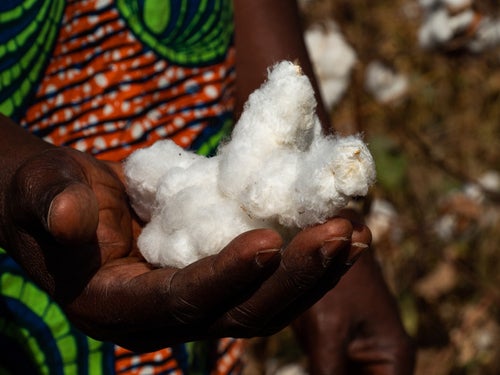
The cotton conference, which was organised by the World Trade Organization (WTO) and UN Conference on Trade and Development (UNCTAD) in July urged donors to create partnerships and make investments that will move Africa’s cotton sector forward.
Representatives of the European Union, the United States, Brazil, the International Finance Corporation of the World Bank Group, the Enhanced Integrated Framework, the UN Industrial Development Organization and Better Cotton all welcomed proposals presented at the conference.
The executive director of the International Trade Centre (ITC) Pamela Coke-Hamilton explained during the conference that new partnerships will help the Cotton-4 countries (Benin, Burkina Faso, Chad and Mali).
Call for action for increased Cotton Made in Africa investments
At the call for action signing ceremony, which took place during the conference, she welcomed Afreximbank’s pledge and said: “Cotton is more than a commodity. It’s more than just transforming fibre into apparel or home textiles. Cotton is a way of life and a road to sustainable development.”
She added: “It is a way to address broader development concerns to promote decent jobs and environmentally friendly, sustainable, and fairly priced products.”
The organisations at the conference announced a “Call for Action” on cotton that recognises the challenges hampering cotton-producing LDCs to compete. The Call for Action commits signatories to continue seeking solutions for the Cotton-4 countries to improve their competitiveness, achieve higher yields and greener production, and add value both to fibre and by-products.
The document was signed by Coke-Hamilton and representatives from WTO and UNCTAD, who co-sponsor the Call for Action. Conference participants from the Cotton-4, UNIDO, the OACPS Secretariat, Afreximbank and Better Cotton also signed the Call for Action.
The ITC is said to help cotton producers add value and create better lives and employment opportunities for women and youth, as well as contribute to Africa’s industrialisation efforts and the operationalisation of the African Continental Free Trade Area.
The ITC’s projects also aim to transform African cotton in a sustainable manner as part of the UN Sustainable Development Goals (SDGs).
Coke-Hamilton said: “Developing better African cotton can reduce the environmental impact of textile and clothing production and mitigate climate change. When sustainability is more important than ever, African cotton offers a lower ecological footprint than cotton made elsewhere.”
WTO director-general Dr. Ngozi Okonjo-Iweala pointed out: “Donors should listen carefully to the project needs and priorities presented by the Cotton-4 countries and other least developed countries (LDCs) so that they can provide tangible support to help realise these homegrown projects.”
She added: “LDCs will need our support to mobilise the financial and technical resources they need so the millions of people whose livelihoods depend on this sector can envisage a better life for themselves and their families.”
The ITC pointed out a recent WTO study suggests that despite cotton production bouncing back to pre-pandemic levels in many LDCs, GDP per capita initially fell by 2.1% on average in ten LDCs with cotton exports dropping by 34% on average in value terms, which is a $500m loss in export earnings.
Okonjo-Iweala believes policymakers should aim to boost productivity sustainably, strengthen competitiveness and add value to cotton goods to strengthen resilience to future shocks.”
Meanwhile, Afreximbank’s senior manager Babajide Sodipo said: “With the operationalisation of the African Continental Free Trade Area, Africa must embrace industrialisation and fully engage its human capital and unique craftsmanship in this sector. The cotton and textile sector provides an opportunity to foster local content and identity.”
WTO’s deputy director-general Jean-Marie Paugam, who moderated the event, is encouraging participants to act on the priority projects highlighted by beneficiary countries and establish a work schedule that would lead to dynamic partnerships and operationalise the projects that have been put forward.
Similarly, Teresa Moreira, head of the Competition and Consumer Policies Branch at the UN Conference on Trade and Development (UNCTAD) called on governments and development partners to redouble support for cotton and cotton by-product projects for new income sources for farmers. She said this could help address development priorities “such as poverty reduction, value addition and economic diversification”.
Cotton-4 countries explain importance of Cotton made in Africa investments
In addition, Escipión Oliveira, assistant-secretary general of the Organization of the African, Caribbean and Pacific States Secretariat (OACP) called for urgent support for the project funding requests put forward by the African cotton-producing countries, introduced by ministers and senior trade officials from the Cotton-4.
Cotton-4 ministers took the opportunity to share the current challenges such as food insecurity and climate change. Plus, the ministers said, difficulties accessing finance and information prevent small farmers from improving cotton output and participating in international trade.
Chad’s Trade Minister and Cotton-4 coordinator, Ali Djadda Kampard, emphasised that development partners play “an essential role” in enabling the country to develop its cotton production, improve its quality and ensure that raw production is transformed into finished products with higher added value for export.
Mali’s Minister of Industry and Trade, Ould Mohamed, said that adequate financing for cotton development projects would “greatly contribute to improving the incomes and living conditions of the most vulnerable populations” in cotton-producing and exporting LDCs. It would also represent “a concrete commitment” towards achieving the Sustainable Development Goals, he added.



